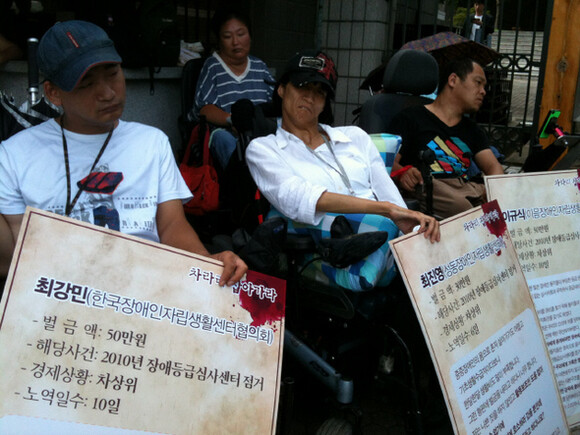hankyoreh
Links to other country sites 다른 나라 사이트 링크
Experts call for overhaul of system to assist the disabled

By Lee Kyung-mi and Jin Myeong-seon, staff reporters
The tragic death of Kim Ju-yeong, an activist for the rights of disabled people, is prompting calls for improvements to the support system for South Korea’s disabled population. Kim died at the age of 33 last week when she was unable to escape a fire that broke out at her home.
Experts are saying South Korea needs a system like Japan’s, if not that of Europe’s welfare states. The overarching principle in support for disabled people in Japan and other developed countries is that everyone is entitled to the services they need without limit. This stands in sharp contrast with South Korea, which restricts eligibility and caps available service hours according to disability level.
In Japan, disabled people are entitled to up to 24 hours a day in care by the Fundamental Law for Disabled Persons. Even those unable to receive round-the-clock care have the option of using the services of an assistant who comes by at 30-minute to one-hour intervals to empty their bedpan and check for any problems. Guidelines stipulate that the assistant should reside “at a location within 30 minutes of” the disabled person’s home.
Japan also has a strong crisis management system linked to local government and public agencies, including hospitals, police stations, and fire stations.
“In Japan, they rig up a big button in the disabled person’s house that he or she can easily press to get in touch with the hospital or fire station at any time,” explained Jeong Jong-hwa, a social welfare professor at Sahmyook University. “Also, disabled people and assistants alike receive ongoing crisis management training to respond to emergency situations like fires, earthquakes, and sexual assault.”
The Japanese government does not base its support on assigned levels of disability. Instead, it has experts conduct close examinations on the ground. The first round consists of a visit by a government employee and an opinion from a doctor or another expert, followed by a second round in which the local government reviews the case to determine eligibility.
Nor does it restrict eligibility according to income or the presence of other people in the household. The aim is not so much to relieve the burden on the family as it is to help the disabled person achieve self-sufficiency. Experts review the cases carefully to ensure that the necessary services get to the people who need them.
Indeed, disabled people in Japan are almost totally free from any financial burden. Low earners receive services for free, while those with high incomes pay 10% at most.
Even that number is mostly on paper. Cho Won-il, a social welfare professor at Kyonggi University, said most disabled people in Japan are spared the 10% self-pay burden stipulated in the Fundamental Law by various other laws for support.
“They prevent money from being wasted by conducting thorough eligibility examinations,” Cho explained.
The situation is very different in South Korea, where disabled people who live with family members or have an income immediately see their support slashed.
“Other countries like Japan have separate systems in place to make rulings and provide services to the people who need them,” said Park Chan-o, director of the Seoul Center for Independent Living. “There is just no reason for the kind of level-based restrictions and caps you find in South Korea.”
Jeong Jong-hwa said the reason Japan has such a strong support system is because of broad-based sympathies for disabled people’s inalienable right to an independent life - the result of years of campaigning.
Experts agreed that South Korean should also use this kind of consensus as a basis for significantly increasing its support budget for disabled people. As of 2007, the budget for disability services was just 0.6% of gross domestic product, far below the 2.1% average for OECD member countries.
Please direct questions or comments to [english@hani.co.kr]

Editorial・opinion
![[Column] Park Geun-hye déjà vu in Yoon Suk-yeol [Column] Park Geun-hye déjà vu in Yoon Suk-yeol](https://flexible.img.hani.co.kr/flexible/normal/500/300/imgdb/original/2024/0424/651713945113788.jpg) [Column] Park Geun-hye déjà vu in Yoon Suk-yeol
[Column] Park Geun-hye déjà vu in Yoon Suk-yeol![[Editorial] New weight of N. Korea’s nuclear threats makes dialogue all the more urgent [Editorial] New weight of N. Korea’s nuclear threats makes dialogue all the more urgent](https://flexible.img.hani.co.kr/flexible/normal/500/300/imgdb/original/2024/0424/7317139454662664.jpg) [Editorial] New weight of N. Korea’s nuclear threats makes dialogue all the more urgent
[Editorial] New weight of N. Korea’s nuclear threats makes dialogue all the more urgent- [Guest essay] The real reason Korea’s new right wants to dub Rhee a founding father
- [Column] ‘Choson’: Is it time we start referring to N. Korea in its own terms?
- [Editorial] Japan’s rewriting of history with Korea has gone too far
- [Column] The president’s questionable capacity for dialogue
- [Column] Are chaebol firms just pizza pies for families to divvy up as they please?
- [Column] Has Korea, too, crossed the Rubicon on China?
- [Correspondent’s column] In Japan’s alliance with US, echoes of its past alliances with UK
- [Editorial] Does Yoon think the Korean public is wrong?
Most viewed articles
- 1‘We must say no’: Seoul defense chief on Korean, USFK involvement in hypothetical Taiwan crisis
- 2N. Korean delegation’s trip to Iran shows how Pyongyang is leveraging ties with Moscow
- 346% of cases of violence against women in Korea perpetrated by intimate partner, study finds
- 4Amnesty notes ‘erosion’ of freedom of expression in Korea in annual human rights report
- 5‘Weddingflation’ breaks the bank for Korean couples-to-be
- 6[Column] Park Geun-hye déjà vu in Yoon Suk-yeol
- 7Will NewJeans end up collateral damage in internal feud at K-pop juggernaut Hybe?
- 8Korea sees more deaths than births for 52nd consecutive month in February
- 9“Parental care contracts” increasingly common in South Korea
- 10[Interview] Dear Korean men, It’s OK to admit you’re not always strong